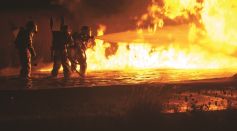ENVIRONMENT & CLIMATE
Daddy Long Legs Genetically Engineered to Get Shorter Legs! Here's How Experts Tinkered With These Harvestmen's Genetics

Morbillivirus Outbreak: Novel Measles-Like Disease Infects Dolphins, Whales Possibly Spreading in Hawaiian Waters
Palmyra Atoll Reef Under Attack: Invasive Corallimorphs Replace Stony Corals, Causing Harmful Effect to Marine Life
Thumb-Size 'Olympic Bat' That Flew Record-Breaking 1,254 Miles Dies From Injuries Inflicted by a Cat
Phytoplankton Biology: How the Powerhouse of Marine Ecosystem Impacts Nutrition Source and Climate Change

Irreversible Climate Change Now on 'Code Red,' UN Fears More Flood, Fire, and Drought Worldwide: Is There a Solution?
Minor Volcanic Eruptions Underwater Can Create Havoc, Resulting to Ash Clouds, Landslides, and Major World Issues
Amputation Surgery Awaits British Teenager Due to Poisonous Brown Spider; Here Are Life Saving Tips After a Spider Bite

Extreme Weather Events Linked to Global Warming and Anomalies in Polar Vortex
Sweet White Flower's Secret Carnivore Stems Uncovered; Scientists Found It’s a Carnivorous Insect Killing Plant

Sea Level Rise Projection Tool: NASA, IPCC Develops Free Online Portal to Help Plan Ahead of the Effects of Rising Seas

'Tightening The Net': New Report Warns About 'Net Zero' Carbon Targets Distracting the Public

Google Wants To Recycle Hard Drives With the Help of Rare Earth Magnets
Australia's Ancient Dragon Fossil Unearthed, Fearsome Reptile Dominated Outback Skies
Most Popular

Starship Spacecraft Explained: SpaceX's Reusable Rocket Built to Take Humans to Mars

How Gravity Really Works: Insights, Mysteries, and What Scientists Are Still Uncovering

Muscle Weakness in Older Adults: Causes, Early Warning Signs, and How to Slow It Down

10 Vital Biological Processes That Keep Humans Alive and Healthy Every Second





